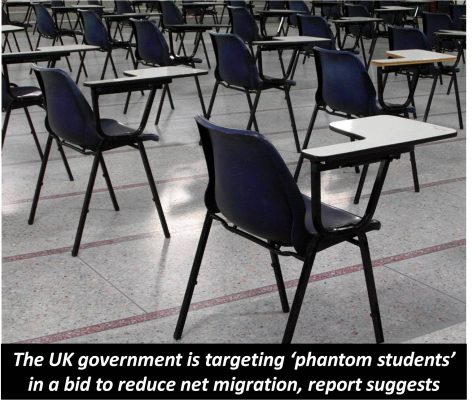By targeting phantom students, the government could be harming local economies and damaging the UK’s international education sector, one of Britain’s biggest services exports.
So says a new report that challenges the way the government estimates the numbers of non-EU students in a bid to reduce net migration.
“While it is right to tackle abuse,” say the Institute for Public Policy Research (IPPR), “this has led the government to implement measures that have hit legitimate colleges and students across the whole sector, damaging the UK’s reputation with international students and our economy as a result.”
 The UK government is targeting phantom students in their bid to reduce net migration, says a new report. It claims the government’s estimates of the numbers of non-EU students who stay in the UK after they finish their courses are based on questionable data.
The UK government is targeting phantom students in their bid to reduce net migration, says a new report. It claims the government’s estimates of the numbers of non-EU students who stay in the UK after they finish their courses are based on questionable data.
The IPPR say the figures the government uses over-estimate the number of international students that stay in the UK when they finish their studies.
The government uses data from the International Passenger Survey (IPS) produced by the Office for National Statistics (ONS), which the IPPR say is a “highly questionable” way to estimate the number of students who stay in the UK when their studies are complete.
Using the IPS data, ministers estimate that every year, around 90,000 non-EU students stay in the UK at the end of their studies.
Actual numbers likely to be nearer half government estimates
However, using other sources, the report authors suggest the numbers of non-EU students who do not leave the UK when their courses finish are likely to be nearer half the government’s estimates.
They describe, for example, how the Home Office’s visa data suggests only around 40,000 non-EU students still had valid leave to remain 5 years later, while the ONS Annual Population Survey suggests only 30,000-40,000 non-EU students are still in the UK after 5 years.
In addition, the report says the Higher Education Statistics Agency (HESA) Destination of Leavers Survey shows that around three-quarters of non-EU higher education students who are in work 6 months after finishing their courses have jobs outside the UK.
While the various data sources do not necessarily measure the same things, the large difference between the IPS-derived estimates and the others would suggest the government figures are not sufficiently reliable, say the IPPR.
Exclude students from drive to reduce net migration, report urges
One of the report authors, Marley Morris, an IPPR research fellow, says their analysis suggests many of the students the government is targeting may be “phantom students who are no longer in the country,” and adds:
“Following the Brexit vote the Government should be doing all it can to secure investment in the UK. But its current self-destructive policy is deterring genuine international students and putting the billions they bring to the UK at real risk.”
Among its recommendations, the report suggests the government exclude students from their drive to “reduce net migration to the tens of thousands.”
It says instead, the government should split up the net migration target into individual components – workers, family migrants, asylum seekers, and so on – and set targets for each.
Canada, Australia, and the United States – UK’s main competitors for international education – class students as temporary, not permanent migrants. The UK should do the same, and not have targets for them, the report urges.
The IPPR also recommend the government follow another example from Australia and set out a 10-year plan for expanding the UK’s international education sector, as part of their new industrial strategy.
Developing and promoting such a plan could be the remit of a new minister for international education, and should also bring in the post-study work visa for STEM (science, technology, engineering, and maths) and nursing graduates. And for 12 months after graduation, such visa holders should be allowed to apply for any graduate job, with no salary threshold.

